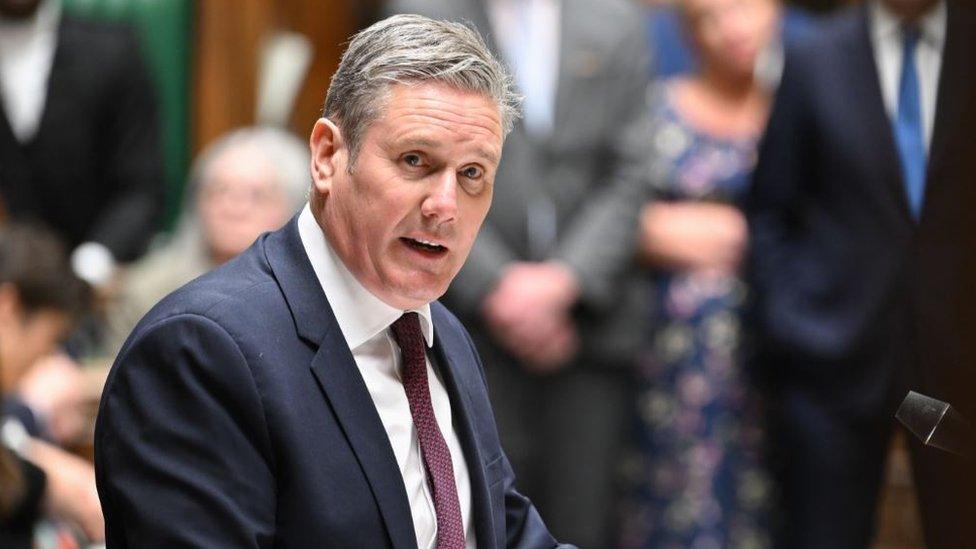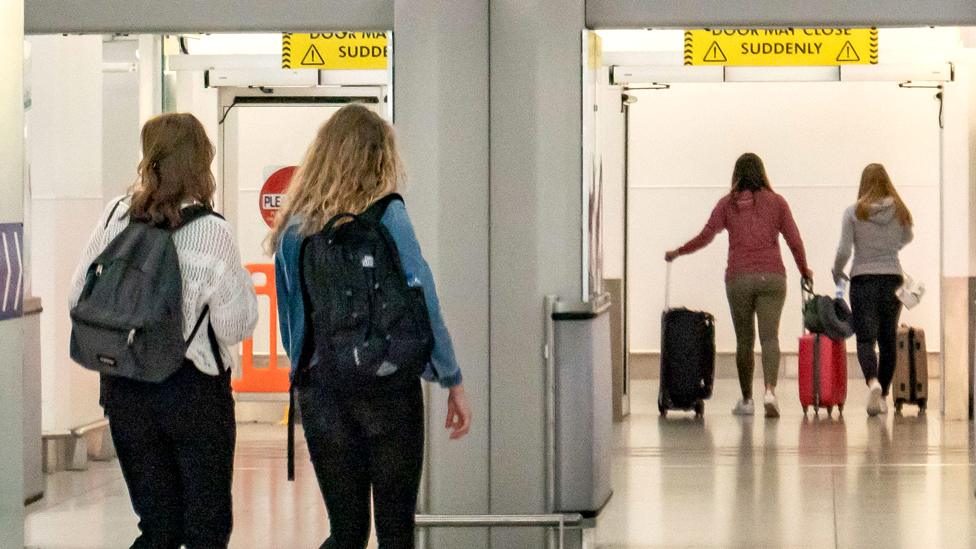Rishi Sunak has lost control of migration, says Keir Starmer
- Published

Sir Keir Starmer has accused Rishi Sunak of "losing control" of immigration, ahead of figures expected to show it has hit record levels.
Official statistics published on Thursday could see legal net migration hit 700,000 for 2022 - dwarfing the previous annual record of 504,000.
At PMQs, the Labour leader said it reflected a "low-wage Tory economy".
But the prime minister said Labour had "absolutely no ideas" of its own to reduce numbers.
Mr Sunak cited new curbs on the family of postgraduate students, announced on Tuesday, as a measure that would help bring migration down.
In the Commons, Sir Keir said Thursday's migration figures would show the government had failed to properly promote skills training for British workers.
He added that the government's apprenticeship levy, introduced in 2017, was "not working" and needed changing to give firms more flexibility.
"They have lost control of the economy, they have lost control of public services and now they have lost control of immigration," he added.
He said if Mr Sunak were serious about "weaning his government off the immigration lever", then he would "get serious about wages in Britain, and get serious about skills and training".
In reply, the prime minister said there was "absolutely no semblance that that there would be any control" over immigration under a Labour government.
He accused Labour of wanting "even more people coming to the UK".
Visa salary requirements
Meanwhile, Labour has promised to change the minimum salary levels for granting visas to foreign workers.
In a statement released shortly after PMQs, the party said it would scrap a 20% reduction in the minimum salary required to get a visa for jobs on a government shortage occupation list.
It did not say when it would make this change if it was in government, adding it would work with businesses to develop a timetable.
It also said it would introduce new training requirements for "key occupations" on the shortage list.
Thursday's migration figures are expected to reflect the effect of refugees coming from Ukraine since Russia's invasion, and a special visa scheme for Hong Kong residents to come to the UK.
They will also reflect a change during Covid in how official migration figures are calculated, with projections now linked more to government data rather than surveys of passengers arriving at UK ports.
Missed targets
The Conservatives previously promised to bring net migration below 100,000 a year ahead of the 2015 and 2017 general elections.
But they ditched the target ahead of the 2019 election, after repeatedly failing to meet it. Mr Sunak now says he wants to reduce immigration overall, but has declined to set a target of his own.
Speaking on BBC Two's Politics Live, Transport Minister Richard Holden said it was "absolutely right" to say the Tories had failed on their target, and said they "have to take more action".
When he campaigned to be Labour leader, Sir Keir promised to "defend free movement as we leave the EU". He now says the UK must end its "dependency" on immigration.
Last week, party chair Anneliese Dodds said Labour wanted to see migration falling in the "medium and long-term". Labour, however, has also declined to set an overall target.
Also appearing on Politics Live, shadow attorney general Emily Thornberry said Labour would offer more training for jobs on the shortage occupation list.
She added she could "see no reason" why overall migration levels should not have fallen by the end of Labour's five-year term of office, if it wins power at the next election.
- Published19 May 2023
